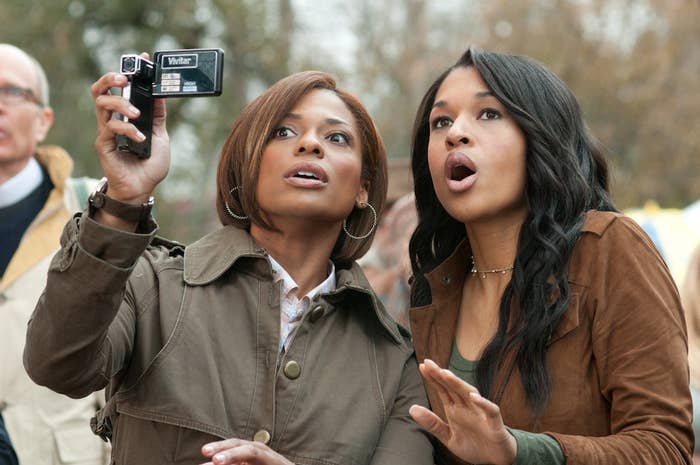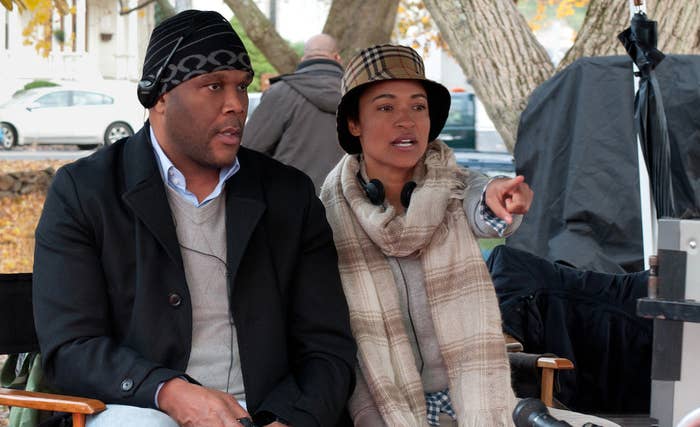
In the new family comedy Peeples, Craig Robinson plays Wade Walker, a kids entertainer who is seriously dating Grace Peeples, a high achieving lawyer played by Kerry Washington. In fact, Wade is so serious, he wants to propose to Grace, but first he has to weather a weekend with Grace's even more high achieving family at their home in Sag Harbor — especially her impossible-to-please federal judge father Virgil (David Alan Grier).
The premise may feel like an African American version of the Meet the Parents movies, but there is another aspect to the Peeples family that sets them apart from the Fockers: Grace's sister Gloria (Kali Hawk, New Girl), a cable news reporter who also happens to be gay.
That may not seem like much. But for a movie aimed at a black audience — especially one produced by Tyler Perry, whose history with gay storylines is, well, let's go with troubled — it's something of a landmark that not only is Gloria already in a committed, loving relationship with her camerawoman Meg (Kimrie Lewis-Davis, Go On), but her trepidation about coming out to her parents is treated no differently than all the other family secrets that drive the film's plot. (Virgil, for instance, is covertly skinny dipping with the town mayor — just go with it.)
"The truth is, we are living [with] and loving gay family members way more than we admit it in the African American community," says writer-director Tina Gordon Chism (ATL, Drumline). "So I did want to present it as matter-of-factly as it actually is, and I didn't want to put an asterisk by the couple. To me, Gloria and Meg are already the golden couple of the family."
Chism, who made her directorial debut with the film, understands how uncommon it is for a film about African Americans to deal with gay issues. "Unless it's a-bout [gay issues], you know what I mean?" she says with a chuckle. "Even then, it's pretty rare."

The notion of including the Gloria/Meg storyline in Peeples came to Chism after her home in the Los Angeles neighborhood of Hancock Park was burglarized. "And then they came back when I was home," says Chism. "It scared me so badly that I asked the policeman, 'Where can I move that's safe in Los Angeles?' He told me the safest community is in West Hollywood, specifically, in the gay community of West Hollywood. So I promptly moved there."
After falling in love with her new surroundings — "I told all my gay friends, 'You guys didn't tell me you have the best drug stores, the best grocery stores, the best hardware stores'" — Chism began to realize how many of her new gay friends and neighbors had complicated relationships with their families. "They had to hide this aspect of their life from their family for fear of being judged, sometimes not knowing what the result would be and just being too scared to come out to them," she says. "Since I was writing a family comedy, I just thought it was time to include that kind of dialogue. I didn't want to get on a soapbox about it, but I wanted to show a loving [gay] couple that really was a part of the family already."
Chism understood this particular family dialogue quite well — a scene from the film comes directly from a conversation she had with her church-going grandmother after Chism's female cousin had come out to the family. "After [my cousin] left, we were with my grandmother, and we really didn't know what she was going to say," Chism explains. "To my uncle, her son, [she said] 'Well, I'm fine with it. I just don't understand how it actually works.' My uncle is always game to describe in detail something like that. 'I'll tell you how it all goes down, mama' is exactly what he said."
When Chism approached Diahann Carroll to play the grandmother in Peeples, however, she says other people weren't sure if the legendary actress would want to tackle to this particularly playful exchange. "The reason the line is so funny is because my grandmother was very Diahann Carroll–esque," says Chism. "And when [Carroll] agreed to do it, I thought, 'These dames are a lot more frisky than I thought!'"
